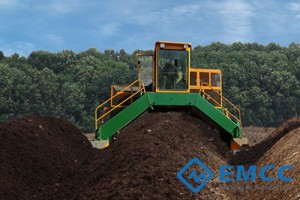The hydraulic lift compost turner is used for the fermentation and turning of organic wastes such as livestock and poultry manure, sludge waste, sugar mill filter mud, slag cake and straw sawdust.
 The role of the hydraulic lift compost turner:
The role of the hydraulic lift compost turner:
1. Stirring function in raw material conditioning.
In fertilizer production, in order to make the raw materials have a reasonable carbon-nitrogen ratio, pH, water content, etc., some auxiliary materials need to be added. The main raw materials and various auxiliary materials, which are roughly stacked together in proportion, can be mixed evenly by the turning machine to achieve the purpose of conditioning.
2. Adjust the temperature of the raw material pile.
During the turning operation, the raw materials are in full contact with the air, and a large amount of fresh air can be added to the mixed pile to help the aerobic microorganisms become active, generate fermentation heat, and increase the temperature of the pile; when the temperature is high, the supply of fresh air can cool the pile. Form a state of continuous alternation of medium temperature – high temperature – medium temperature – high temperature, and various beneficial microorganisms grow and multiply rapidly in the temperature range they are adapted to.
3. The permeability of the raw material pile.
The turner can process the material into smaller clumps, making the dense and viscous material pile fluffy and elastic, and forming a suitable porosity between the materials
4. Adjust the moisture of the raw material pile.
The suitable water content of the raw material fermentation is about 55%. During the fermentation of the turning operation, the aerobic microorganisms react positively to generate new water. The consumption of raw materials by oxygen-consuming microorganisms also makes water free from carriers.Therefore, in the process of fertilizer making, not only water evaporation can be formed by heat conduction, but also water evaporation can be formed by turning the raw materials by the turner.
5. To realize the special requirements of the composting process. Such as the crushing and shaping of raw materials or the quantitative displacement of raw materials.
Post time: Mar-04-2022